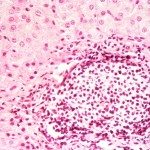Lien vers Pubmed [PMID] – 11676835
J. Invest. Dermatol. 2001 Oct;117(4):935-42
Patients suffering from epidermodysplasia verruciformis are prone to nonmelanoma skin cancers, due to an inherited abnormal susceptibility to the oncogenic human papillomavirus type 5. Genotoxic sunlight ultraviolet B radiations are likely to be a cofactor. Lesions of two human-papillomavirus-type-5-infected epidermodysplasia verruciformis patients collected during an 8 y period were retrospectively studied for p53 mutations in exons 5 through 8 by a polymerase chain reaction single-strand conformation polymorphism technique and/or by DNA sequencing of amplified exons. Mutations were detected in 11 of 26 (42.3%) specimens, including five (62.5%) squamous cell carcinomas, three (33.3%) Bowen’s carcinomas in situ, two (40%) actinic keratoses, and one (33%) benign lesion. The nine mutations characterized by sequencing were shown to be missense and to affect mutational hotspots in human cancers. Five were C–>T transitions at dicytidine sites considered as ultraviolet signature mutations. Two were transversions (C–>G and C–>A) at dicytidine sites and two were C–>T transitions at nondipyrimidine sites. A marked p53 immunoreactivity was disclosed in 72.7% of 11 invasive carcinomas, 55.6% of nine carcinomas in situ, 37.5% of eight actinic keratoses, and one of three benign lesions. This includes 81.8% of 11 specimens with a p53 mutation but also 50% of 14 specimens with no mutation detected. A dysfunction of the p53 gene is thus likely to play a part in epidermodysplasia verruciformis carcinogenesis, either due to ultraviolet-B-induced p53 mutations, as in nonmelanoma skin cancers in the general population, or involving other mutagens or mechanisms. The part played by human papillomavirus type 5 proteins expressed in epidermodysplasia verruciformis keratinocytes remains to be determined.

